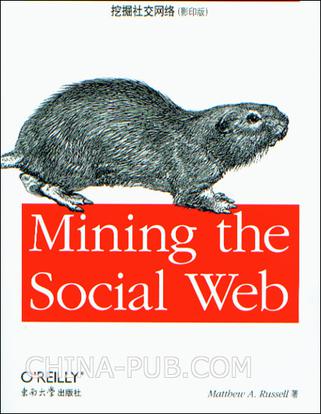《挖掘社交网络》
 挖掘社交网络txt,chm,pdf,epub,mobi下载
挖掘社交网络txt,chm,pdf,epub,mobi下载作者: Matthew A·Russell
出版社: 东南大学出版社
副标题: Analyzing Data from Facebook, Twitter, LinkedIn, and Other Social Media Sites
原作名: Mining the Social Web: Analyzing Data from Facebook, Twitter, LinkedIn, and Other Social Media Sites
出版年: 2011-5
页数: 332
定价: 78.00元
ISBN: 9787564126865
内容简介 · · · · · ·
《挖掘社交网络(影印版)》,本书简洁而且具有操作性的书将为你展示如何回答这些甚至更多的问题,你将学到如何组合社交网络数据、分析技术,如何通过可视化帮助你找到你一直在社交世界中的内容。
作者简介 · · · · · ·
马修·罗塞尔(Matthew A.Russell),Digital Reasoning Systems公司的技术副总裁和Zaffra公司的负责人,是热爱数据挖掘、开源和Web应用技术的计算机科学家。他也是《Dojo: The Dofinitive Guide》(O'Reilly出版社)的作者。在LinkedIn上联系他或在Twitter上关注@ptwobrussell,可随时关注他的最新动态。
目录 · · · · · ·
preface1. introduction: hacking on twitter data
installing python development tools
collecting and manipulating twitter data
tinkering with twitter's apl
frequency analysis and lexical diversity
· · · · · · ()
preface
1. introduction: hacking on twitter data
installing python development tools
collecting and manipulating twitter data
tinkering with twitter's apl
frequency analysis and lexical diversity
visualizing tweet graphs
synthesis: visualizing retweets with protovis
closing remarks
2. microformats: semantic markup and common sense collide
xfn and friends
exploring social connections with xfn
a breadth-first crawl of xfn data
geocoordinates: a common thread for just about anything
wikipedia articles + google maps = road trip?
slicing and dicing recipes (for the health of it)
collecting restaurant reviews
summary
3. mailboxes: oldies but goodies
.mbox: the quick and dirty on unix mailboxes
mbox + couchdb = relaxed email analysis
bulk loading documents into couchdb
sensible sorting
map/reduce-inspired frequency analysis
sorting documents by value
couchdb-lucene: full-text indexing and more
threading together conversations
look who's talking
visualizing mail "events" with simile timeline
analyzing your own mail data
the graph your (gmail) inbox chrome extension
closing remarks
4. twitter: friends, followers, and setwise operations
restful and oauth-cladded apis
no, you can't have my password
a lean, mean data-collecting machine
a very brief refactor interlude
redis: a data structures server
elementary set operations
souping up the machine with basic friend/follower metrics
calculating similarity by computing common friends and followers
measuring influence
constructing friendship graphs
clique detection and analysis
the infochimps "strong links" apl
interactive 3d graph visualization
summary
5. twitter: the tweet, the whole tweet, and nothing but the tweet
pen: sword∷ tweet: machine gun (?!?)
analyzing tweets (one entity at a time)
tapping (tim's) tweets
who does tim retweet most often?
what's tim's influence?
how many of tim's tweets contain hashtags?
juxtaposing latent social networks (or #justinbieber versus #teaparty)
what entities co-occur most often with #justinbieber and #teaparty
tweets?
on average, do #justinbieber or #teaparty tweets have more
hashtags?
which gets retweeted more often: #justinbieber or #teaparty?
how much overlap exists between the entities of #teaparty and
#justinbieber tweets?
visualizing tons of tweets
visualizing tweets with tricked-out tag clouds
visualizing community structures in twitter search results
closing remarks
6. linkedln: clustering your professional network for fun (and profit?)
motivation for clustering
clustering contacts by job title
standardizing and counting job titles
common similarity metrics for clustering
a greedy approach to clustering
hierarchical and k-means clustering
fetching extended profile information
geographically clustering your network
mapping your professional network with google earth
mapping your professional network with dorling cartograms
closing remarks
?. 6oogle buzz: tf-idf, cosine similarity, and collocations
buzz = twitter + blogs (???)
data hacking with nltk
text mining fundamentals
a whiz-bang introduction to tf-idf
querying buzz data with tf-idf
finding similar documents
the theory behind vector space models and cosine similarity
clustering posts with cosine similarity
visualizing similarity with graph visualizations
buzzing on bigrams
how the collocation sausage is made: contingency tables and scoring
functions
tapping into your gmail
accessing gmail with oauth
fetching and parsing email messages
before you go off and try to build a search engine.
closing remarks
8. blogs et al.: natural language processing (and beyond)
nlp: a pareto-like introduction
syntax and semantics
a brief thought exercise
a typical nlp pipeline with nltk
sentence detection in blogs with nltk
summarizing documents
analysis of luhn's summarization algorithm
entity-centric analysis: a deeper understanding of the data
quality of analytics
closing remarks
9. facebook: the all-in-one wonder
tapping into your social network data
from zero to access token in under 10 minutes
facebook's query apis
visualizing facebook data
visualizing your entire social network
visualizing mutual friendships within groups
where have my friends all gone? (a data-driven game)
visualizing wall data as a (rotating) tag cloud
closing remarks
10. the semantic web: a cocktail discussion
an evolutionary revolution?
man cannot live on facts alone
open-world versus closed-world assumptions
inferencing about an open world with fuxi
hope
index
· · · · · · ()
相关文章
- 6条评论
 algernon阿尔杰农2024-06-28 21:17:32
algernon阿尔杰农2024-06-28 21:17:32- 感谢谢谢
 Growup(成熟)2024-06-28 23:38:05
Growup(成熟)2024-06-28 23:38:05- 感谢谢谢
 Payne派恩2024-06-29 05:31:42
Payne派恩2024-06-29 05:31:42- 谢谢分享
 triste悲哀的2024-06-29 05:00:06
triste悲哀的2024-06-29 05:00:06- 感谢谢谢
 冷淡丨desolate。2024-06-28 22:30:39
冷淡丨desolate。2024-06-28 22:30:39- 感谢谢谢
 monster怪兽2024-06-29 00:32:40
monster怪兽2024-06-29 00:32:40- 感谢谢谢

